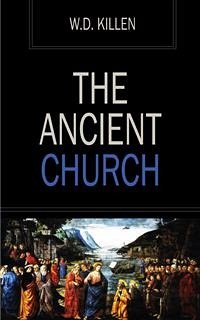In the interval between the days of the apostles and the conversion of Constantine, the Christian commonwealth changed its aspect. The Bishop of Rome—a personage unknown to the writers of the New Testament— meanwhile rose into prominence, and at length took precedence of all other churchmen. Rites and ceremonies, of which neither Paul nor Peter ever heard, crept silently into use, and then claimed the rank of divine institutions. Officers, for whom the primitive disciples could have found no place, and titles, which to them would have been altogether unintelligible, began to challenge attention, and to be named apostolic. It is the duty of the historian to endeavour to point out the origin, and to trace the progress of these innovations. A satisfactory account of them must go far to settle more than one of our present controversies. An attempt is here made to lay bare the causes which produced these changes, and to mark the stages of the ecclesiastical revolution. When treating of the rise and growth of the hierarchy, several remarkable facts and testimonies which have escaped the notice of preceding historians are particularly noticed.
Some may, perhaps, consider that, in a work such as this, undue prominence has been given to the discussion of the question of the Ignatian epistles. Those who have carefully examined the subject will scarcely think so. If we accredit these documents, the history of the early Church is thrown into a state of hopeless confusion; and men, taught and honoured by the apostles themselves, must have inculcated the most dangerous errors. But if their claims vanish, when touched by the wand of truthful criticism, many clouds which have hitherto darkened the ecclesiastical atmosphere disappear; and the progress of corruption can be traced on scientific principles. The special attention of all interested in the Ignatian controversy is invited to the two chapters of this work in which the subject is investigated. Evidence is there produced to prove that these Ignatian letters, even as edited by the very learned and laborious Doctor Cureton, are utterly spurious, and that they should be swept away from among the genuine remains of early Church literature with the besom of scorn...
Some may, perhaps, consider that, in a work such as this, undue prominence has been given to the discussion of the question of the Ignatian epistles. Those who have carefully examined the subject will scarcely think so. If we accredit these documents, the history of the early Church is thrown into a state of hopeless confusion; and men, taught and honoured by the apostles themselves, must have inculcated the most dangerous errors. But if their claims vanish, when touched by the wand of truthful criticism, many clouds which have hitherto darkened the ecclesiastical atmosphere disappear; and the progress of corruption can be traced on scientific principles. The special attention of all interested in the Ignatian controversy is invited to the two chapters of this work in which the subject is investigated. Evidence is there produced to prove that these Ignatian letters, even as edited by the very learned and laborious Doctor Cureton, are utterly spurious, and that they should be swept away from among the genuine remains of early Church literature with the besom of scorn...









